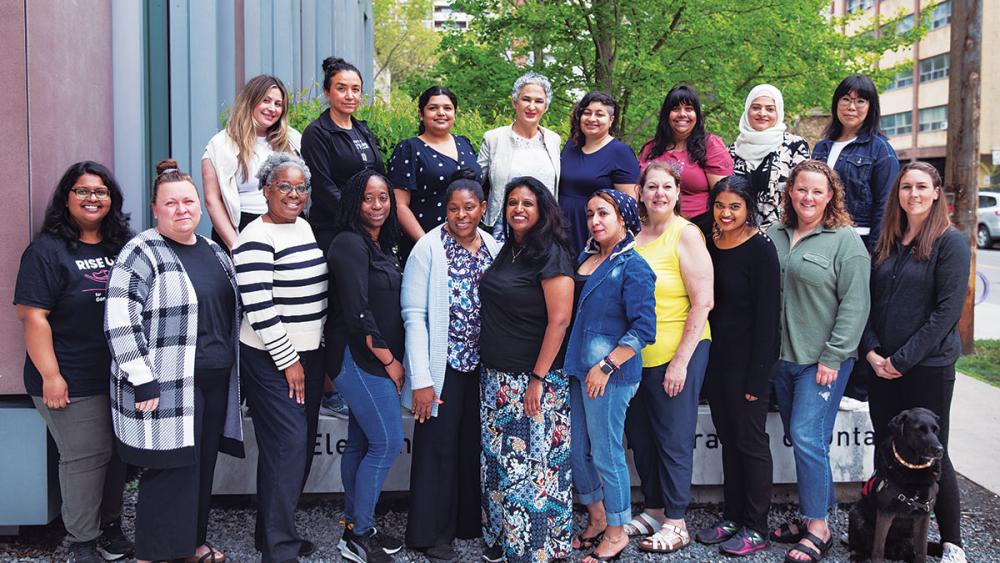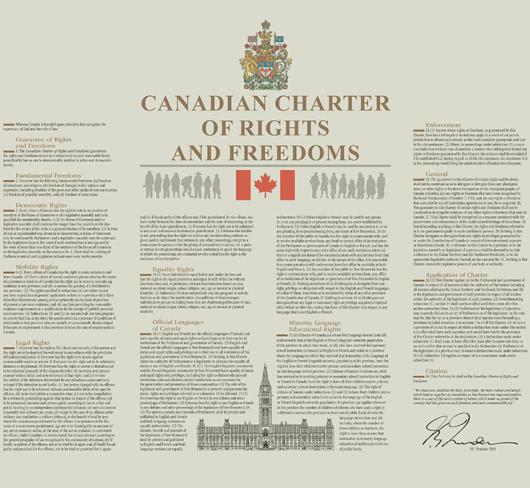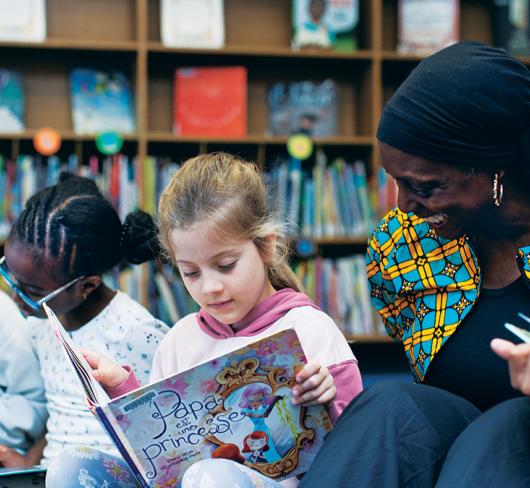
The Power of a Program
It has been almost a full year since my journey as a participant in Leaders for Tomorrow (L4T) officially came to an end, but looking through the many messages of encouragement and support still being shared in our group chat, it feels as though this program has transcended the boundaries of the ETFO building and continues to operate within us.
Leaders for Tomorrow offered our diverse group both intentional and spontaneous learning opportunities, and the connections we formed during and between the four sessions endure. After 20 years and over 440 participants, it is safe to say that ETFO is succeeding in the goal, as described by Carol Zavitz in Cracking the Glass Ceiling: Transforming Lives Through Women’s Union Education, of equipping women from designated groups “with the skills, knowledge and networks needed to access leadership positions within the union.”
Leaders for Tomorrow is an ETFO Women’s Program created in 2004 to bring women members from designated groups (First Nations, Métis, Inuit; member with a disability; 2SLGBTQ+; and/or racialized) together in a supportive space, not to see how we can fit into the mould of “a leader” but to help us better understand how we already are leaders, how to recognize and hone our power, elecand how we can redefine what “leadership” looks like. At its inception, the objectives of L4T were:
- to provide information, strategies, supports and skills to women from designated groups to enhance their leadership abilities
- to encourage participants to expand their leadership roles with ETFO in the provincial and/or local arena
- to encourage participants to prepare and apply for senior staff positions within ETFO
- to foster a community of diverse women within the federation to ensure their voices are heard and their issues are addressed
According to Zavitz’s 2019 essay, while these objectives have evolved over the years in response to “changing political needs of the union and the cycles of progress, resistance, backlash and resilience that affect social justice and equity work,” as well as to broaden considerations of leadership beyond the union space, these foundational goals remain at the heart of the program for good reason. Critics may point to a program like L4T and call it unnecessary or exclusionary to non-women members; however, the data clearly shows that women remain significantly underrepresented in ETFO leadership roles, just as they were 20 years ago. L4T offers a space where leadership positions are demystified for women members and made into tangible possibilities, where a sisterhood is created to uplift and support women leaders, and where we can openly dream up much-needed changes, then work together to make those dreams into reality.
My experience in L4T was transformative. As a white, queer, occasional teacher from a smaller northern local, I was removed from the full scope of work ETFO does. L4T helped me feel empowered in both my social and geographical locations; the program facilitators and other participants made me consider how my unique lived experience is an asset. Together, we examined our personal leadership styles, set professional goals, considered various conflict resolution strategies, and practised writing and delivering an elecand tion speech or annual meeting resolution. We celebrated our progress over the year, supported each other through challenges or setbacks, and became stronger as a collective and as individuals.
From this strengthening of self, I have continued more confidently on my personal leadership path both with my local executive and beyond the union. I am proud to follow in the footsteps of past participants who have taken what they have learned and continued to grow into leadership positions that call to them. I am already an invested member of my local executive, like countless other L4T grads, but what else does my future hold?
Past L4T graduates have taken on local presidencies, won provincial executive positions, become ETFO staff, moved into administrative positions within their school boards, and found non-education spaces where they have been able to flourish as leaders, professionally and personally. Because of my time in L4T, I know that I am capable of following any and all paths that feel right for me – and I know that I have a network of sisters who will support and champion me, no matter how near or far away our journeys take us.
And more than this, I am more conscious of the societal bias that tells us not to view women who are Indigenous, racialized, queer, or disabled as the leaders they are and/ or could be, and I am committed to elevating the voices and experiences of those around me who are smashing societal expectations.
Looking ahead, my hope is that the Leaders for Tomorrow program remains a priority for ETFO for at least another 20 years. Bringing together a diverse group of women and building community takes focused effort and time; it cannot be rushed. The time that facilitators and participants have in this program really allows women to explore their own identities, address pre-conceptions of what leadership looks – and feels – like, roleplay hypothetical scenarios we might not yet have the confidence to face in the real world, and sit in on and learning about operations at meetings such as Representative Council. All of these opportunities have been key to my learning journey.
Do you have an L4T impact story to share? I hope you will share your experience with your local members and encourage them to apply for this program in its 21st year!
Maranda Dumas is a member of the Lakehead Occasional Teacher Local.
PATRICE OCONNOR, Peel Elementary Teachers’ Local (2017-18)
“Leaders for Tomorrow was a space where women empowered other women to be their authentic selves while leaving room for others to be heard and share their stories. I became part of a supportive and encouraging sisterhood that celebrated my successes and encouraged me to take on new roles and challenges. I not only learned about my leadership style, but more about myself as a woman and activist. Since leaving L4T I have been a school steward, a member-at-large on our executive, an anti-racism and equity committee chair, and I now serve as a local vice-president. L4T taught me what it means to be part of a social justice union and how I can impact change in a variety of leadership roles.”
KIM BROWN, Upper Canada Occasional Teacher Local (2023-24)
"Participating in Leaders for Tomorrow has been such a great experience. In the past year I have learned so much about the union and the resources and programs available to members. I have met so many wonderful people. As a deaf teacher, these opportunities have given me the chance to talk about accessibility and to meet other teachers with disabilities. The support, encouragement and empowerment that are nurtured through this program have changed my life for the better."
NKESE CHARLES, Upper Grand Teacher & Occasional Teacher Locals (2022-23)
“Leaders for Tomorrow was the perfect balance between connection and content, creating a space where we could build meaningful relationships with participants (many of whom I still keep in touch with) while gaining a deeper understanding of ETFO’s service areas and programs.
One of the highlights for me was learning about ETFO’s leadership pathways. It was a great reminder that there is truly a place for everyone in the union. I had been intrigued by the role of the parliamentarian after attending the Annual Meeting, but hearing an ETFO staff member speak so passionately about the training and her love of rules really pushed me to go for it. For any woman looking for a supportive space to ask questions, grow their leadership skills and figure out their next steps within the Federation, Leaders for Tomorrow is the place for you!”
MANPRIT RAI, Peel Elementary Teachers’ Local (2023-24)
“I am deeply passionate about my work in education and take great pride in teaching and inspiring the next generation. Participating in Leaders for Tomorrow was a truly transformative experience. The program significantly enhanced my leadership skills while fostering a sense of community among like-minded professionals. It provided me with the space to reflect, set goals and strategically plan for the future.
It was incredibly empowering to be surrounded by such inspiring and driven women from across Ontario, each bringing unique perspectives, aspirations and experiences. The support we offered one another, both during and beyond the program, continues to be a source of strength and motivation. For anyone seeking meaningful professional development and a strong network of support, I wholeheartedly recommend Leaders for Tomorrow.”
KENISHA BYNOE, Elementary Teachers of Toronto Local (2012-13)
“Leaders for Tomorrow was an inspiring program that pushed me to take risks in my teaching journey. I met a network of women who, like me, were seeking to explore their ideas, curiosities and visions for change. Like a tapestry, these women all wove stories, perspectives and advice that prepared me to be a better educator. I am forever grateful for this program because it shifted my approach to teaching and learning and revealed to me the possibilities for collectivity at ETFO.”
ANTIONETTE PAYNE, Durham Teacher Local (2023-24)
“Participating in Leaders for Tomorrow has been a deeply transformative experience. From the very first session, I felt welcomed into a powerful space where women leaders came together to learn, grow and support one another. What made this program exceptional was not just the rich content and thoughtfully designed learning sessions. It was the relationships, the sense of connection and the trust built among participants and facilitators.
The most powerful outcome was the community we created. We organized events together, created a WhatsApp group to stay connected, and continue to support one another. We share resources, upcoming leadership opportunities, and offer encouragement during challenging times. The friendships formed during this program are lasting, and I am so grateful for the women who are now part of my circle. Leaders for Tomorrow reminded me that leadership is about lifting others, creating space, and leading with integrity and care.
As a woman in leadership, I can confidently say I am a product of ETFO Women's Programs."
ETFO Governance 2023-2024 (Ranked)
ETFO governance ranked from the highest to the lowest percentage of members who identify as women:
- Membership - 81%
- Chief negotiators - 81%
- Local executive members - 80%
- Standing committee members - 71%
- Local presidents - 66%
- Provincial Executive members - 64%
- Annual Meeting delegates - 62%
- Representative Council attendees - 53%
ETFO collects and tracks demographic information and the Equity and Women’s Services area collates much of the data to do with the participation of women members. The overall number of women members has remained the same since ETFO’s inception (with about 80%-82% of members identifying as women.) When the Leaders for Tomorrow program began in 2004/5, there was a concerted effort to encourage more women who had intersecting identities (we now use the terms racialized, members with a disability, 2SLGBTQ+, or Indigenous) to move into leadership positions. Anecdotally, there has been a shift, though women seeking out leadership opportunities since 2004 has remained consistent. One area where there has been a significant shift is in collective bargaining. In 2004, only 44% of Chief Negotiators in locals identified as women, whereas there were 81% Chief Negotiators who identified as women in 2024.

